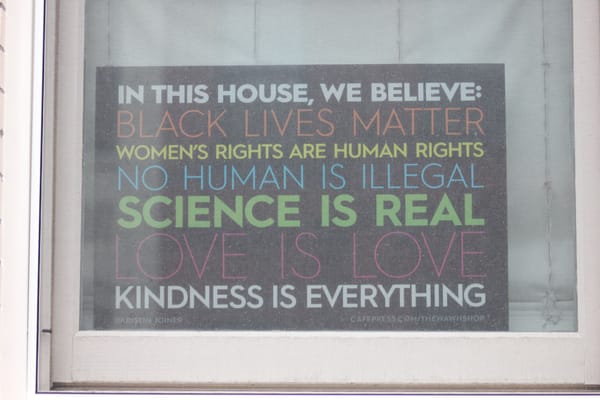Last December, The Washington Post ran an article about “spiritual collectives” emerging across America. These progressive, post-Christian alternatives to church sing Beatles and Bono tracks, rather than hymns. They welcome “people of all faiths and no faiths.” Most important, they preach questions instead of answers. According to the Post, “spiritual collectives” are defined—and distinguished from churches—by their resistance to dogma.
But are they really? A closer read makes it abundantly clear that these communities are united by articles of faith. They just happen to be articles of progressive politics, rather than of traditional religion.
At such spiritual collectives like Atlanta’s Vining Lakes, nationalism and capitalism are subject to “bold critiques.” And Miami’s Heartway and Tucson’s Aldea espouse commitments to “diversity” and “enacting social justice.” All three pseudo-churches are places where “LGBTQ inclusion is not up for debate.” You can bet that if an evangelical Christian, Orthodox Jew, or conservative Muslim turned up at them, he would soon be branded a heretic.
“Americans are exchanging one set of beliefs for another.”
In short, the sociologists were wrong. Scholars of religion used to think religious decline would correspond to a rise in the population of “nones”—those who believe and care about nothing in particular beyond mundane realities. But it seems more accurate to say that Americans are exchanging one set of beliefs for another––religion for political ideology.
Public professions of faith. Confessions of sin. Demands for orthodoxy under pain of social outcasting. In recent years, we have seen them all, not in communities of faith, but in communities of identity politics. Such fanaticism manifests on both sides of the post-Christian ideological spectrum, but it is far more widespread on the left than on the right.
First came the cult of “intersectionality,” which one political scientist labeled a “church” as far back as 2017. Then came the viral spread of rituals of wokeness and Pride. Last June, Major League Baseball paid homage to an “order of queer and trans nuns” who perform twisted parodies of the Catholic Mass. Today, we have “spiritual collectives.” Modern progressivism’s transformation from academic theory to popular pseudo-religion is complete.
Leftists may hope for their belief systems to replace true religion. They may cherish dreams of the “Church of the Woke” giving Americans the sense of transcendent meaning and civic duty that Judeo-Christian values used to inspire. But the progressive left is a far cry from genuine faith. Like the totalizing ideologies of the 20th century, modern progressivism plays on people’s spiritual needs and desires for material ends. It teaches that ultimate happiness depends on the achievements of perfect “equity” in this life. This makes political activism a moral necessity, and it encourages extremism. For proof, just look at the outbreak of anti-Semitism and pro-Hamas rhetoric on elite college campuses.
Faith couldn’t be more different. The great religions of the world teach that ultimate happiness comes from being grounded in eternal truths. They teach that service of God and neighbor is the height of human virtue. And they teach us to trust in a plan that transcends the here and now, delivering us from the all-consuming urgency of politics.
To put these faiths on the same plane as left-wing ideology is nonsensical. In a society plagued by polarization, loneliness, depression, and anxiety, religion is a salve, and wokeness is a poison. Don’t take my word for it. Take the word of the countless social scientists whose research documents the social and psychological benefits of faith—and the detriments of political fanaticism.
What’s more, it is increasingly clear the left has no intention of respecting anyone who dissents from progressive orthodoxy. The Southern Poverty Law Center labels anyone who believes a man is a man and a woman a woman “extremist.” The Human Rights Campaign and allied local groups issue “travel advisories” when states enact laws to protect minors from irreversible chemical experiments.
Nor is such behavior limited to activist groups funded by anonymous donors. For instance, the misleadingly named Respect for Marriage Act, enacted in 2022, established a legal preference for liberal views on sexuality and gender. Many Republicans voted for the bill because they were enticed by its religious exemptions. Those protections, however, will do little to protect faith-based organizations from progressive extremism. But more to the point, when you agree to be the exception to the rule, you may end up legitimizing the rule itself.
In the eyes of many on the left, traditional religion isn’t a reasonable system of belief. Our “enlightened” elites see it as a regressive source of bigotry that may be conditionally tolerated but never fully accepted. The more ground conservatives give to fanatical ideologues, the more our freedom will depend on the leniency of the woke mob.
Those of us who belong to a historic faith must defend ourselves in legislatures around the country, never conceding that our rights are mere privileges. But we must also live out our faith in our local communities. When we do so, it will be all the more obvious that left-wing pseudo-religion is unequal to the real thing.
Common sense, social science, and other objective criteria agree: America needs traditional religion, not the religion of wokeness. Those who are afraid or ashamed to stand by that claim do little justice to themselves, and even less to their nation. God help us if, when the dust settles, all the United States is left with is an “In This House” yard sign and a communal John Lennon-singalong.
